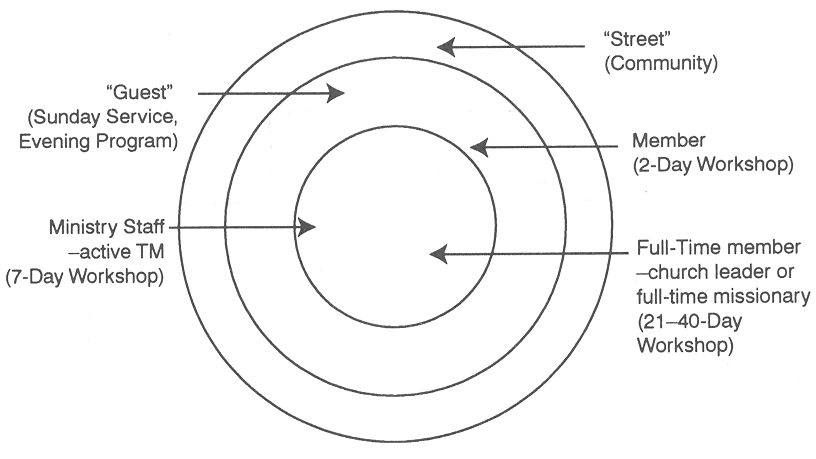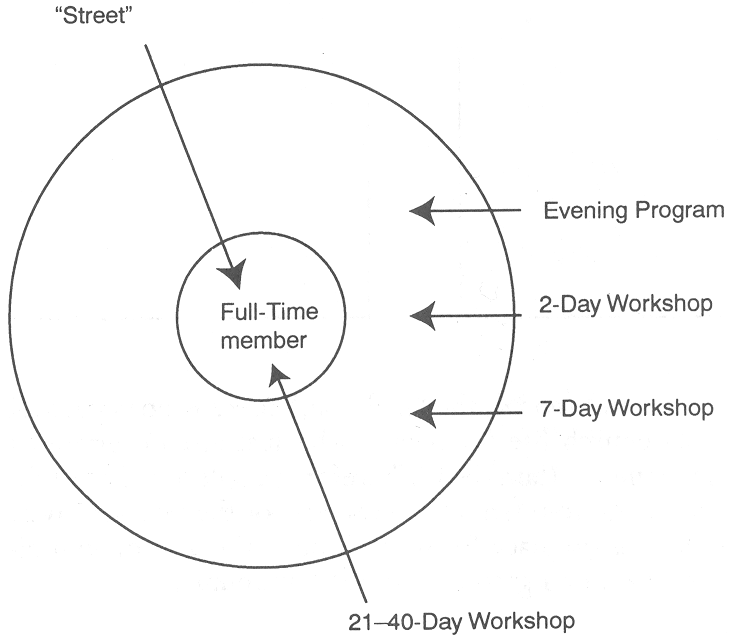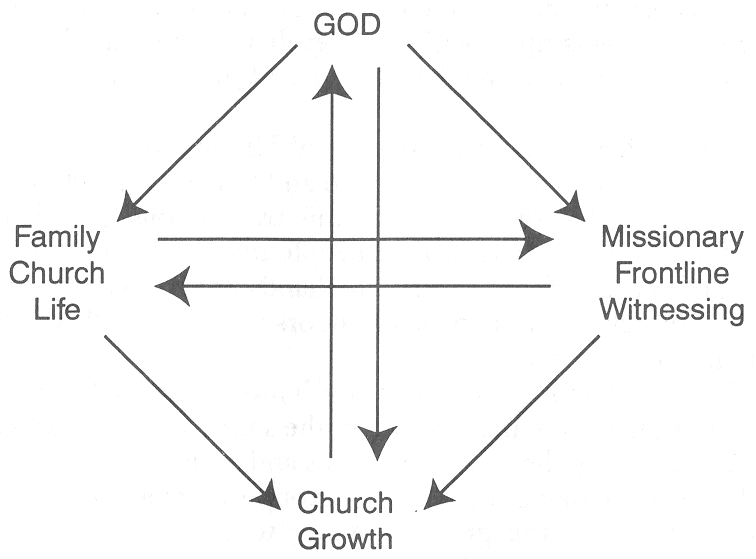
Family, Church, Community, Kingdom

Tyler Hendricks
|
|
Family, Church, Community, Kingdom |
|
|
|
Tyler Hendricks |
Five - Education
Each local church needs a step-by-step educational program, beginning with Sunday Service and moving through stand-alone lectures and half-day, one-day and two-day seminars. These courses should take the person along the path that we formerly covered through the introductory lecture, one-day or two-day workshops, seven-day workshop, 21-day workshop and forty-day workshop, including internal guidance. We have a palette of rich educational content.
What we need, I am well aware, is, in the words of Steve Jares, "something I can hand to my neighbor." We need a curriculum for unchurched people, on the one hand, and a curriculum for churched people, especially Christians, who are already on the road of kingdom building. We need to develop levels of education, with clear goals and methods, a secure system even with certificates of graduation denoting commitment to God and True Parents.
I do not think that headquarters can or should produce all these materials, although we should definitely do more than we have been. The best education is generated locally. It begins with Hoon Dok Hae discussion groups. These are setting a fire right now in the hearts of Christian ministers. Hoon Dok Hae actually can serve as a bridge between our curriculum for the unchurched and for committed believers of other churches.
Another responsibility of our educational department is advanced content for Tribal Messiahs. The church leader can do this in a weekday evening service, adult Sunday school or church school classes, or through the small groups.
|
Sun |
Mon |
Tue |
Wed |
Thu |
Fri |
Sat |
|
Worship Services |
DP - TFV - PLA Presentations for all ages |
Small Group Mtgs |
Believer Service |
Small Group Mtgs |
DP for all ages Presentations |
Half Day Seminar |
|
Depart to 2-day WS |
2-day WS |
Be Unchanging
Rev. Larry Stockstill, who has built a large cell church in Louisiana, found that we win souls by personal relationships, not by events such as witnessing blitzes, big-days, television spots or special events. These programs, he writes, lack consistency and create an on-again, off-again church. Everyone pushes, gets worn out, loses energy, and has to be pumped up again. (Rev. Larry Stockstill, The Cell Church)
Above is a possible monthly schedule. Of course, monthly schedules have little meaning if they are not adhered to consistently. It is a schedule for a sizeable church of a couple of hundred families or more. Each local church can decide its own schedule. More important than what the schedule is, is that you follow it consistently. The Family Federation in Chicago meets twice a month no matter what. They are building community. Community is being built in the Bay Area, where Friday evening Principle lectures for all ages take place no matter what, and twice a month sleepovers at the church, and seeker-sensitive Sunday services, no matter what.
The Family Church Educational Model
We need to have church life for families, including people at all levels of faith commitment. People at all levels should be affirmed as God's children. Solid education is provided at all levels for people to take when they are ready. This education leads people to deeper and greater commitment to True Parents. All members eventually become "full-time members" or, as Rev. Henri Schauffler calls them, "fully committed members. "All members are "disciples," even as they hold a job or attend school. Perhaps this was impossible in the past, because the snares of the world were too strong and the demands for front-line, mobile manpower too great. But the times have changed. Of course, we can still witness to individuals, even though the center of gravity has shifted from the single individual communal center to the family-based church community.
We need to offer a life-long course of education and activities for people of all ages
Many churches are program-focused and event-focused. They do many good projects and activities, but they do not grow. They simply move from one program to the next and one event to the next with no thought of moving in a strategic direction." (Rev. Darrell Robinson, Total Church Life)
Frontline Witnessing With Family/Church Support

Frontline Witnessing With No Family/Church Support

Frontline Witnessing With Family/Church Support

Jacob's Ladder
Frontline Witnessing With No Family/Church Support

The Church on a Pedestal
In the second model, the "pedestal," there is no organized educational church life for people who just attend service or are home members (families). Therefore people are either full time -- separated from family and career -- or they are sent away because there is no place for them. This is the trait of an individualistic sect, not a growing church community.
This has been our basic situation. To follow the apocalyptic path, we had to sacrifice family and career. Therefore, we have been sacrificing families (the second generation) and career (business and institutional success). The apocalyptic era is over. God won the war. Now we are kingdom building on the foundation of God's footprints on earth through True Parents. Consider the foundation upon which we now stand.
Landmark Dates in the Transition from Wilderness to Settlement
Themes of Major Declarations
The result of these declarations, from the viewpoint of church mission and structure, is that the radical separation of our community from the world is not necessary. The disconnection between the world and the church is dissolving, because God has claimed victory over the world. He can claim everything in the world. This is the settlement age, not the separation age. This has major implications for the method of witnessing and education. We do not have to ask people to give up their jobs and schooling or dramatically interrupt their everyday schedules in order to learn about and fit into the Kingdom. We have already crossed this line in our hearts, but our church infrastructure has not yet made the adjustment. Our church is somewhat schizophrenic. One result is that we have no place to bring people for spiritual sustenance and education. Now is the time to restructure.
Restructuring means building communities that can minis-ter to individuals and families in all situations of life, including our own. We reach people where they are at, and win their love and trust and gradually help them find their place and make their offering in the Kingdom. Reaching out in this way, surely we will create friendships and community. Out of that mix of people, some will emerge called by God for ministry and missionary work. They will become core leaders.
Interrelationship of Community Church and Witnessing
The STF within the Family Church is the link between conventional church growth and frontline witnessing to single people. A healthy church naturally does frontline witnessing within its total church life. It is especially valuable for the spiritual growth of youth. But the trends are against success in this style of witnessing. We do not practice it in Korea and Japan to any great extent.
For leaders gifted to pursue a street-witnessing ministry, a successful Family Church is the environment in which it can succeed on a long-term basis. If we have a strong church life, family educational program, social action projects and ecumenism, then active witnessing for full-time members is a supplemental means to gain new members. But research and experience prove that it should not be our only method. In the autumn of 1999, a huge amount of street witnessing brought little membership increase, because we have no family church for people to join. If we have no family educational program, no church life, no social action or local ecumenism, then our missionary outreach is unprotected and we look like a cult. This is because we only work with young people who can drop everything to work with us full-time, and we cut off everyone else.
The results would be humorous were they not so painful. Rev. Jenkins notes the funny sight of a 50-something, gray-haired and heavy-set mother of five handing out flyers to kids on a college campus, inviting them to join her group for dinner. The kids get disoriented. We get disoriented as well. Bento Leal recounts that when he teaches Divine Principle to Bay Area youth, he feels as if he is in a Star Wars bar.
A survey of 34,000 Christians asked the question of how they came to the church:
|
Special need: |
1-2% |
|
Walk-In: |
2-3% |
|
Liked the pastor: |
5-6% |
|
Visitation: |
1-2% |
|
Sunday School: |
4-5% |
|
Evangelistic crusade: |
.5of1% |
|
Church program: |
2-3% |
|
Friend/relative: |
75-90% |
(McIntosh & Martin, Finding Them, Keeping Them, p. 45)
Children's Education
Two blessed families I know personally are afraid that their teenage daughters are going to run off. No, not run off with a boyfriend. Rather, run off to a Baptist church. Why? Because the youth program of the local Baptist church is so great, and the youth program of the local Unification church is, well,... not so great. Kids, like communists, vote with their feet.
I believe that parents join churches that their children like.
It's not rocket science to conclude that to get parents to join your church, one way is to create fine programs for children. Glen Martin, in his seminar on church growth, stated that the one who decides whether to come back or not is the wife. And the top two items upon which she evaluates the church are: 1.Cleanliness of the women's bathroom; 2.Quality of the child-care.
Our brother Gunther Freystetter of Miami reports about a church that had 50 members in 1996 and today has 3,000. His observation is that the reason for this tremendous growth is that they are having their young people do everything. Every aspect of church life is put into the hands of their youth. (By the way, this church has opened its doors wide to the PLA curriculum. Has yours?)
Once upon a time, we were a youth movement in America. A favorite photo of mine is found in the songbook, Songs of the Garden, following the song #98, "Hills and Valleys." There, on a hillside overlooking a pond, is a group of American young people sitting on the grass, listening to another American young person, Jennifer (Morrison) Hager, speaking to them. When I look at that photo, I realize that we were once the fulfillment of the youth culture of America. We were in large part creating our own leaders. We were youth leading youth.
Willow Creek goes so far as to have access cards to the children's area during worship service, so that only approved staff can go to the nursery area. We're not ready for that, but the point is that children's education is a high priority and it is an investment that pays off tremendously in church health and church growth. Whether you see us as building the kingdom of heaven on earth based upon the acclamation of True Parents, or slugging it out to find our niche in the American religious marketplace, we can agree on the need to provide heavenly education for children. There is no excuse for our failure to invest in the education of youth.
A Settlement-Era Formula Course
World CARP created a 7-year formula course for youth.
Whether we stay with it exactly or develop it, it is a starting point for our offering field experience for all our interested young people. This week in Los Angeles I encountered an STF MFT. Boy, I thought, this is where I want my kids to be when they are old enough. They were into, as far as I could tell, the esprit de corps, the purity, the vision-defining and the deep inner-work that I experienced in the best of my days on MFT.

For most of our youth, STF is the best way to embark upon a successful life. It is the beginning of personal ministry. It provides a universal foundation for all in their spiritual life. Ministry can diversify as people mature. When the kingdom is built and witnessing is no longer necessary, activity during this phase of life can be one of volunteer public service and spiritual and moral training. It should become fully integrated into the church as our standard program for members who are 17 - 24 years old -- both for those born into the church and those who convert.
Here is the present STF course:
Doctrine
I have not yet addressed the question of doctrine. This is mainly because I am addressing methods that function to build churches irrespective of doctrine. Church growth books are "doctrine neutral." This does not mean doctrine is not important. It means that, first, new paradigm churches are not adventurous doctrinally. They are conventional in terms of doctrine. In this area, they are completely traditional. Second, they keep doctrine practical. Their interest is not "what is truth?" but rather "how do we apply the truth in daily life?" But doctrine does play an important role in setting absolute standards of behavior, and in this respect doctrine is very important.
Our teachings, like those of any faith system, have two purposes. The first is to bring the listener to a life-changing experience of the holy. Our unique message is that God has anointed our True Parents to substantiate the Kingdom of God that Jesus died for and all religions expect. Two, our teachings are meant to help the listener live for the sake of others, to live a principled life, a life in the practice of true family values. The first step is rebirth (Justification) and the second is sanctification.
Our first steps of education deal with the basics of the principle of creation, what we often refer to as true family values. These provide a common ground we share with people of all faiths. In fact, affirmation of true family values is hardly doctrine; it is basic common sense about the logic of love. It defines the belief system, or ethical norms, for the Family Federation. People of all faiths are FFWPU members based upon their commitment to true family values, centering on the ideal of true parents and the blessing.
Our interpretations of biblical doctrines such as the human fall, the last days, the Trinity, Christology, resurrection, pre-destination, providential history and the Second Advent are particular to us. People can belong to the FFWPU without accepting these interpretations. Affirmation of these teachings, I propose, makes one a member of the Family Church. I will discuss this in Chapter Nine more fully, but to draw the main point here, my suggestion is that members of the Family Federation "do church" in many settings, only one of which is the Family Church. Others may include the Catholic Church, Baptist Church, Assemblies of God, Beth Israel Synagogue and local mosque. Though the doctrines may differ, hopefully the ethics of living unselfishly and rearing a healthy family will permeate every religious institution.
Action Steps:
Kick it in gear. You can start with programs for your own kids. If they are under 12, they most likely will attend without much use of brute force!
Download entire page and pages related to it in ZIP format
Table of Contents
Information
Tparents Home